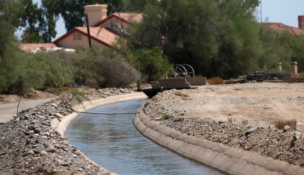No relief in sight
Arizona Capitol Reports Staff//May 2, 2008//[read_meter]
Public policy groups seeking to overhaul the state’s revenue-collection system say recent developments in the Capitol have confirmed their belief that if citizens want tax reform, they would have to do it themselves – through the ballot.
The organizations were invigorated by Gov. Janet Napolitano’s veto of a proposal that would have made a property-tax relief program permanent and the Legislature’s failure so far this year to pass any taxation reforms.
Several ballot initiatives have been filed this year that would bring California-style property-tax caps to Arizona, in response to rising property taxes.
If the tax initiatives succeed, they would likely put Arizona in a much deeper financial hole than the one it’s already in. The revenue loss associated with one of the initiatives is so significant the head of a tax watchdog group said he cannot imagine how the state would survive it.
The groups have until July of this year to get 230,047 valid signatures for each initiative to qualify for the November ballot — a gargantuan task. But inaction at the Capitol might give them enough ammunition in their “revolt” against the current tax system.
Already, a taxpayer association has decided to support a California-style property tax cap after determining that the Legislature is unlikely to pass a tax reform this year, and that even if it did, the governor is likely to reject the legislation.
In recent years, the Legislature has successfully cut both income and property taxes.
The Sun City Taxpayers Association is now actively gathering signatures for Prop 13 Arizona, which has filed an initiative that seeks to place a 0.5-percent tax cap on the assessed value of residential property and a 1-percent cap on taxes for all other property classifications. The initiative would establish a baseline value for all properties at their 2003 level and limit annual valuation increases to 2 percent. Also, properties added to the tax rolls after 2003 would be valued at their purchase prices.
“We tried the legislative method,” said Tracy Spoon, executive director of the Sun City Taxpayers Association. “(Now) we are putting an all-out effort between now and the time signatures need to be collected in July.”
The tax group initially supported legislation that would set limits for special taxing districts and allow override votes for fire and flood-control districts. The Arizona Tax Research Association, which is pushing for the legislation, has been seeking reform in the area of secondary levies.
But the House version of the legislation failed in March, and an identical Senate bill has yet to be brought to the floor for third reading. Those familiar with the Senate measure said it does not appear to have enough votes to pass.
There are two types of property taxes in Arizona — primary and secondary. Primary taxes are levied by local governments, community colleges, and school districts to pay for maintenance and operating costs. Primary taxes on residential property are capped at 1 percent of full cash value. The levy increase is limited to no more than 2 percent annually, plus the cost of new construction.
Secondary taxes pay for special districts, fire districts and bonds. They are used to build infrastructure. Right now, there are no limits on secondary taxes.
Retirement community will be hit hard
Sun City has big reasons for concern.
Spoon said the community has seen valuation increases of up to 60 percent between 2006 and 2008. Most residents in the community are retired and living on fixed incomes. Any property-tax increase hits them hard.
“It wasn’t our first choice,” Spoon said, referring to her group’s decision to get behind Prop 13 Arizona. “Ideally, we would have preferred the Legislature to act, but they didn’t. And with our community looking at the largest tax bill they are ever going to see in 2008, we felt that we needed to do something.”
The governor’s veto of the property-tax relief, the Legislature’s failure to pass tax reform so far this year, and rising property taxes all seem to be a volatile mix that could explode in November.
But it remains to be seen if there is enough anger among taxpayers to motivate them to sign tax-initiative petitions, or to volunteer to help gather the signatures.
“The constituents want reasonable and predictable property taxes, and despite all the talk and concern and all the problems caused by our current property tax system, nothing has been accomplished to fix it in the Legislature,” said Lyn Weaver, chairwoman of the Prop 13 Arizona. Weaver said the governor’s veto has certainly helped them in their petition drive.
That sentiment is shared by some lawmakers.
“If you are going to make any meaningful tax reform, apparently it’s going to be at the ballot and not coming out of the Legislature,” said Ron Gould, a Republican senator from Lake Havasu.
Gould introduced one of the tax initiatives as a bill in the Senate. But neither his bill nor other measures that mirror other tax initiatives have advanced.
Marc Goldstone, chairman of the Bullhead City-based Arizona Tax Revolt, lamented that Gould’s legislation did not get anything beyond an informational hearing. And now he’s looking toward the ballot for tax relief; one initiative rolls back property values to 2003 levels; the other requires that taxing entities return to 2005 levy levels.
People are upset that property tax rates have risen faster than their income, Goldstone said.
“Turning in 230,000 signatures on July 3 to qualify for the ballot will let the wolves know that we taxpayers… will no longer tolerate property taxation without limit,” he said.
Both the Arizona Association of Counties and the League of Arizona Cities and Towns oppose the Prop 13 Arizona initiative and the two registered by Arizona Tax Revolt.
In an earlier e-mail, Ken Strobeck, executive director of the League of Arizona Cities and Towns, said any reduction in property-tax revenues results in one of two things: An equal amount of revenue would have to be raised from other sources, such as sales or income taxes, or state services would have to be cut.
“Secondary taxes are approved by the voters, and they are approved for the purpose of infrastructure and construction,” Strobeck said. “So if people are concerned about secondary taxes, they should look at the items that are on the ballot and whether they approve them or not.”
But as the deadline approaches for petition signatures, the groups supporting the initiatives will have to raise more money — fast.
Prop. 13 Arizona raised about $1,500 between Nov. 28 and Dec. 31 of 2007, according to its January report to the Secretary of State’s Office.
Arizona Tax Revolt, which has two initiatives, received more than $7,200 in the same period for one of them and raised about $30,000 between November 2006 and December 2007 for the other.
A big boost
Kevin McCarthy, president of the Arizona Tax Research Association, said the governor’s veto is a “big boost” to the groups behind the tax initiatives. It could provide them the opportunity to secure financing for their signature drive, he said.
McCarthy said the groups could get some momentum out of the veto — precisely what his association has hoped to avoid by pushing for tax reform through the Legislature, where things can be modified, unlike in an initiative that is inflexible and almost impossible to undo. He wasn’t surprised that the Sun City Taxpayers Ass
ociation made the move to support the Prop 13 Arizona initiative, he said.
McCarthy said the legislation his organization is pushing calls for “reasonable limitations on annual growth.”
For example, the bill includes an annual limit of 10 percent for fire district levy increases, which is still big, he said.
Veto has spurred talks of ballot referral
The governor’s veto of H2220, which would have repealed the state equalization tax rate, also has spurred talks of a ballot referral containing the language of the vetoed bill. A referral originates in the Legislature and essentially works the same way as an initiative.
“I think there is some momentum behind that. I think people are looking at that. And that’s something that we are talking about,” said Senate Majority Leader Thayer Verschoor, a Republican who represents District 22.
“That has come up in conversations,” said Senate President Tim Bee. “Although I would say it is very early in the conversation process and no determination has been made at this point.”
The Republican leaders said the decision as to which ballot referrals to pursue will be done later in the session. ?

















